Building the Lovecraft Investigations
How a notion becomes a universe.
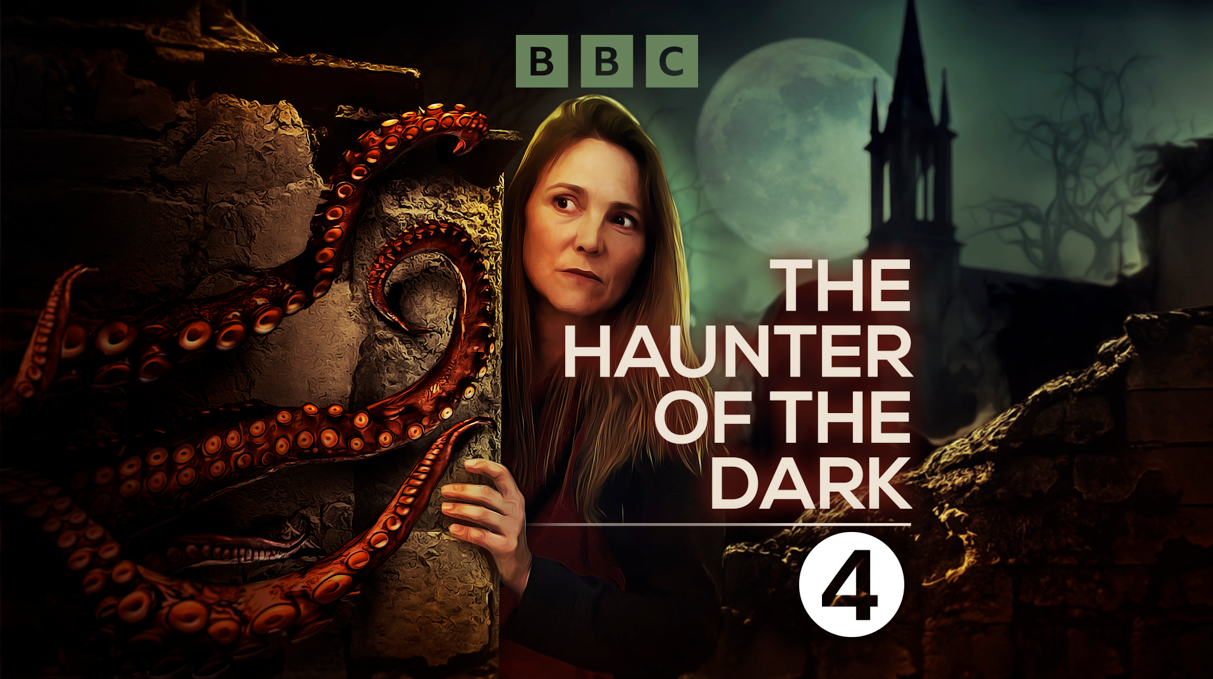
(This is a re-post from the Development Hell Substack - apologies to those of you who might be seeing this twice)
None of this was supposed to happen.
Sometime back in 2018, Karen Rose, the finest producer in all of audio, managed to persuade the BBC to pick up an idea I had been noodling with for a while. Serial had just been a big deal in the podcast world, and I had this notion that you could update an H.P. Lovecraft story within the framework of a supposed true crime podcast. The story I had chosen was The Case of Charles Dexter Ward, which was far from the briefest of Lovecraft's stories, but I liked that there was a ton of backstory in there about the witch trials of the 1600s, and I figured that would give potential investigators a lot to sink their teeth into. I hadn't really imagined that anyone would go for it, it had in fact been turned down a few times at the BBC, but then BBC Sounds came onto the scene. Karen pitched it to them, and Rhian Roberts liked the idea, and suddenly I was writing a ten-part podcast series.
I had written radio plays, but never a whole audio series before, so I was very much making it up as I went along. And I don't like to plan stories out, so I was making it up as I went along from that perspective too. I created two hosts for the show: an English guy called Matthew Heawood, who would probably mostly stay rooted in the studio, and a female American investigator called Kennedy Fisher, who would rove around and get herself into scrapes.
So far so good. A patient goes missing under mysterious circumstances from a mental asylum in Providence, Rhode Island. His doctor subsequently goes insane and murders a young woman in London. A good platform for a mystery and two investigators with complimentary skills to look into it.
The tone of the show was dictated by the true crime framework, and I immediately made a rule that there would be no "audio drama" element to this. I didn't want it to sound pretty, I wanted all the location sequences to be recorded by Kennedy, on a handheld machine, and I wanted people off-mic, and I wanted handling noise etc. I wanted it messy because messy would make it sound real, and real would make it more scary.
Moreover, I wanted the show to feel like it was made by Kennedy and Heawood, not by us - they didn't have our resources and, crucially, they were not us: I have lost count of the number of times we have deliberately done something "wrong" in these shows, because "that's how Heawood would edit it".
The bigger issue, though, was that I had ideas, but I didn't yet have a story.
I spent a fair amount of time in the "back stacks" of the London Library (and subsequently sent characters there in the show), delving into old occult books and books of folklore. A book on Mesopotamia gave me a connection to Lovecraft's mythos and a way to bring in the famed Necronomicon, and some of the legends of Mesopotamia birthed the idea of Ipqu-Aya; a sorcerer who had figured out a way to become immortal by being reincarnated into the bodies of others. This was to be my adaptation of the Joseph Curwen story from the original book, but my Curwen had been running a witch coven in the New Forest in the 1960s.
Building out that coven, and connecting its members into the British Establishment, gave me another ingredient: conspiracy - an alternate history of twentieth-century Britain that would make a great sandpit and would also help give the story some roots in English folklore.
And so I went back to the library (ALWAYS back to the library) and started digging into British folklore and history. Aleister Crowley (obviously), James Murrell, the witch craze of the 60s and 70s, the Process Church of the Final Judgement etc etc. Crowley gives us Enochian magic, which leads us back to John Dee and suddenly we're in the court of Queen Elizabeth I. This research was all joining up in unexpected ways (which has been the case for all the seasons so far), and the story kept expanding sideways, as well as back and forth through history. I needed someone to cover this stuff. I didn't just want to drop in bits and pieces here and there, I wanted the research itself to form its own narrative. I needed a character who could make that happen. I needed Dr Eleanor Peck.
Episode 7 of season 1. I'd handed in the script to Karen, and she was on the phone explaining, very calmly, why I had clearly gone mad. One whole episode of a new character monologuing the historical backstory? No action, no drama, just pure exposition? The audience would flee en masse. No one was ever going to sit through this. I had worried about this myself, and yet I knew that I found it interesting. I understood all the reasons why it shouldn't work, but I really felt that it just... Did. I actually thought it was the best script yet. But I knew I couldn't convince Karen based purely on a gut feeling. I needed a secret weapon.
"It's Nicola Walker."
A beat of silence on the other end of the line. Then... "OK, yeah, that would work."
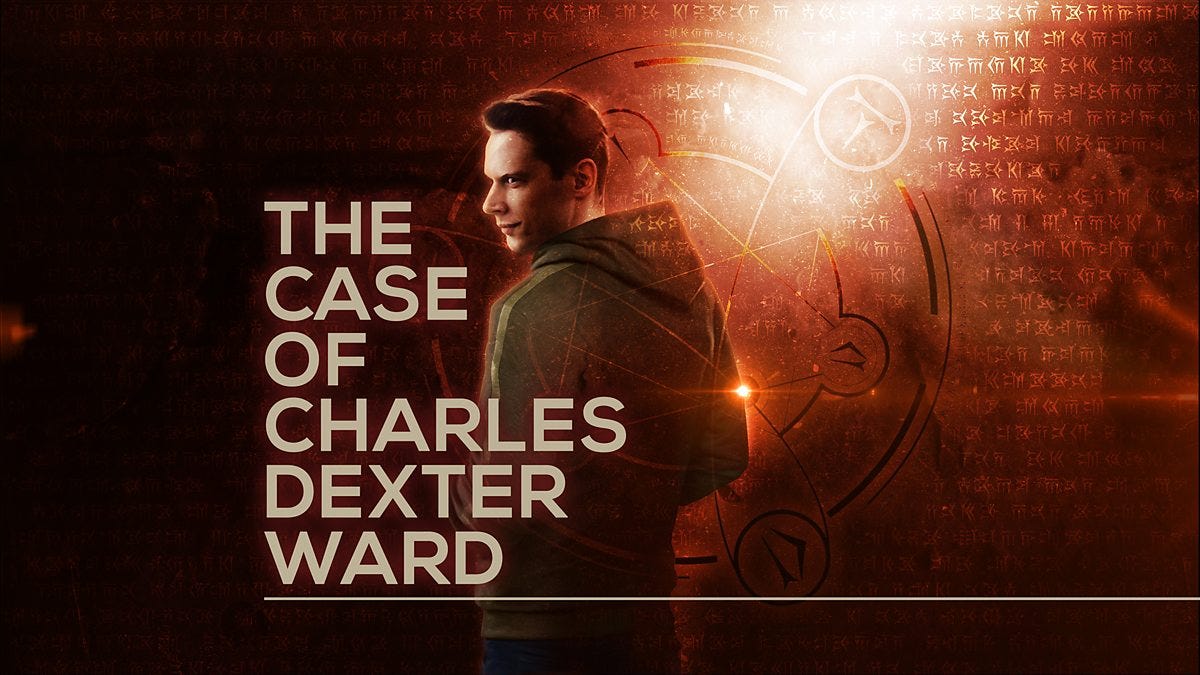
The Case of Charles Dexter Ward appeared on BBC Sounds early in 2019, and was a surprise hit (a surprise to me at least). We seemed to have got the balance just right, and we seemed to be doing particularly well with people who didn't usually like audio drama. This was a fresh thing, a fictional story told within a framework that was listenable in a car, while walking the dog etc. It didn't feel like you were huddled around a wireless in 1950, it didn't feel like television without pictures, it felt like its own thing; specifically audio.
(If you haven’t heard it, the original trailer will give you a flavour.)
It didn't hurt that that audio was recorded by David Thomas, who is the finest sound person in the industry, and who had no compunction about taking perfectly recorded sound (ALL his sound is perfectly recorded) and then fucking it up to make it sound more home-brewed. He was even happy to let Jana Carpenter, who played Kennedy, hold the recorder and manage a lot of her scenes herself, and just buy the handling noise and mistakes inherent in that.
It also didn't hurt that the music (which also had to ONLY be present where Heawood would put it in, not where WE would want it) was composed and performed by Sweet Billy Pilgrim's Tim Elsenburg. He gave us the perfect signature theme for the show-within-a-show, as well as stunningly detailed drone beds to lay under Eleanor Peck's monologues. Fans of the show have told me that they only need to hear the first few notes of the theme to get goosebumps.
What the audience REALLY fell in love with though, was the two central characters. Barnaby Kay and Jana Carpenter breathed such authentic life into Matthew Heawood and Kennedy Fisher. They were real people, all at sea in a mystery that had rapidly got deeper and darker than they ever anticipated. They were our Dantes, leading us through this world, but they never knew more than we did, were no braver than us, and they were never less shocked by the twists and turns.
I had assumed that this series was going to be a one-off. So I put a little sting in the tail, as a nasty little pay-off and walked away.
Just a few weeks after the launch, Karen Rose was back on the phone, "They want another one."
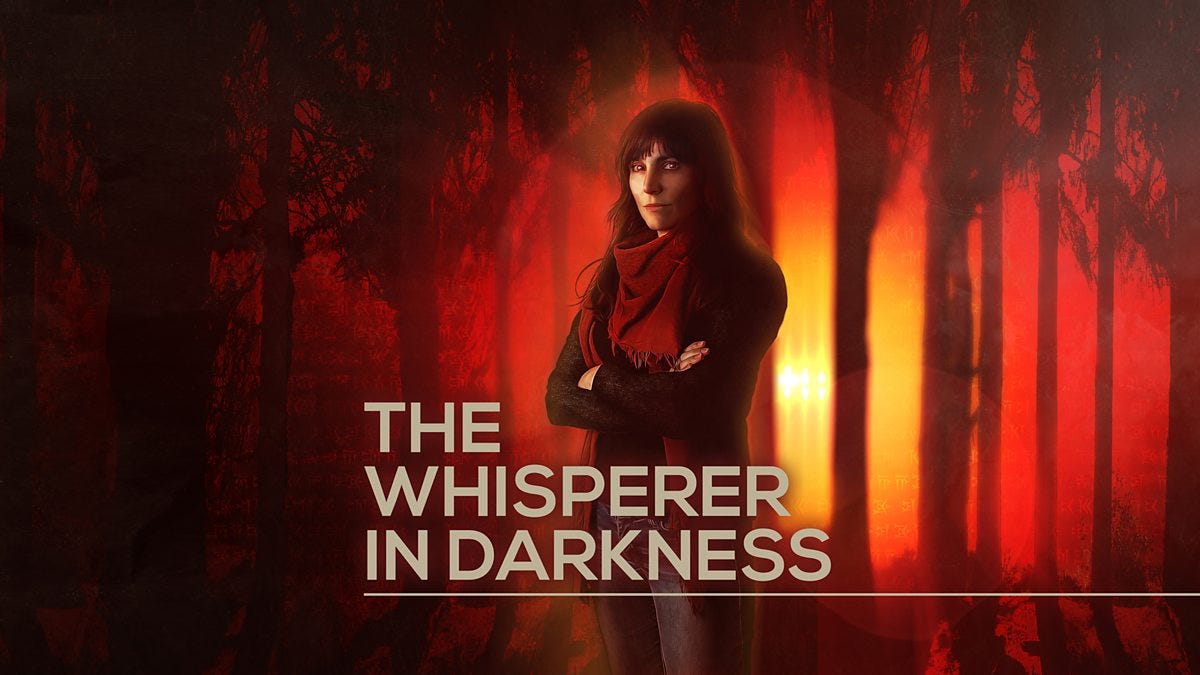
I was only too happy to go back to this world, but it was going to be a completely separate story, a brand-new mystery. Fascinated by the Rendlesham UFO incident of 1980, I decided to take Lovecraft's "The Whisperer In Darkness" as my jumping-off point.
Season Two opens with the disappearance of Henry Akeley from his home on the edge of Rendlesham Forest in Suffolk. I brought Kennedy and Heawood into the house and had them looking around. I didn't know what they would find, had no real idea where this story was going to go (making it up as I go along again). All I had in my head was that this was all new - no connection to the previous season apart from the presence of the two lead characters and Eleanor Peck. And then, in the upstairs room of that house, our leads spotted a photograph of Akeley with Amelia Fenner, a key member of the New Forest coven from the first season.
This was not supposed to happen, but when it did (and after I had fought vigorously against it and lost the battle) it opened up a whole world. Actually, a whole universe... If this story tied into Season One, then it also tied into all the backstory of Season One. And if it did that, then it could equally branch out into other audio dramas I had done. Suddenly I was finding connective tissue everywhere, as if my subconsious had been laying a trail of breadcrumbs for years that would lead me to this moment, to this photograph on the wall of a fictional house in the Suffolk countryside.
Season Two brought in elements from Season One, but also elements from a previous play, "Bad Memories". And then there came a moment where Kennedy was driving along a remote lane on the Suffolk coast and saw a figure standing on the verge up ahead. Again, I was surprising myself. The figure was dressed in black, she was wearing sunglasses... Oh shit, this was Parker, one of the leads from the "Mythos" series I had made for Radio 4 a while back. If Parker was here, that meant the Department of Works was involved. And that suggested that this was all leading to one place... Pleasant Green.
And with that was born what became known (thanks to an incredibly diligent fan who built a wiki page) as the "Pleasant Green Universe". Season Two's tentacles spread into all corners of the Mythos series, Bad Memories, and several other plays, TV ideas and movie scripts that I had been playing with.
A vast family tree started to grow, detailing the connections between the different characters going back through time, and a timeline emerged that went from the present day all the way back to 600 BCE. This thing was HUGE, there were so many stories that could be told here...
Season Two landed just as well, if not better, than Season One. And so Season Three needed to be prepped and executed. The story was growing, the cast was expanding, the situations were getting more and more extreme... I felt like I was reaching the climax ("The whole culmination of the thing," as Parker puts it.) I decided that The Shadow Over Innsmouth would be the last season. I had run out of road and I needed to go out with a bang. A huge, sprawling international story, a load of loose ends tied up, the reappearance of Pleasant Green... And a tragic ending, the loss of a major character. Kennedy standing in the middle of a vast, empty landscape, howling into the dark.
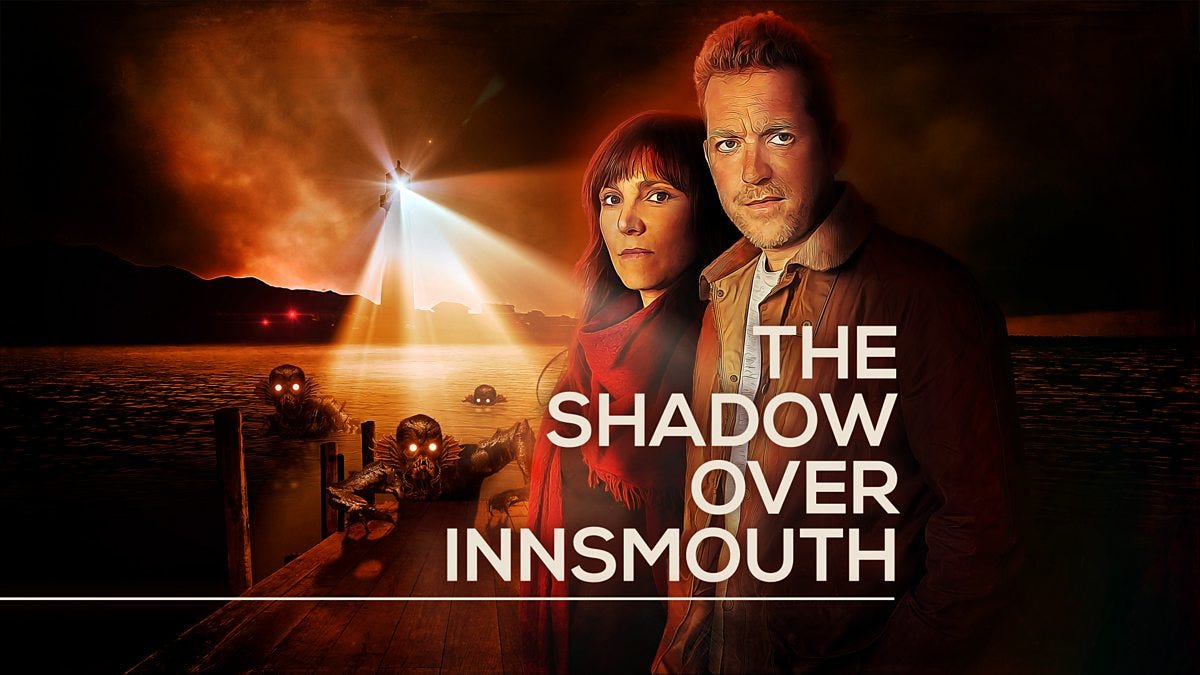
"The Shadow Over Innsmouth" came out late in 2020. By this point, the "Lovecraft Investigations", as the story as a whole had been branded, was one of the most successful fiction podcasts in the world, which was kind of insane considering I had dreamed it up at home, and in the London Library's shadowy stacks, and had been allowed to write and record whatever the hell I wanted for three seasons straight with zero interference. But I was done with it now. Not with Pleasant Green - there were still stories I wanted to tell there - but with Kennedy and Heawood and the Lovecraft Investigations.
Or so I thought...
"Who Is Aldrich Kemp?" was a spy-fi audio series I created, which came out in 2022. Some people thought this was an extension of the Pleasant Green universe, but it wasn't supposed to be. The series bolts onto a whole other thing that hasn't properly seen the light of day yet. This was a clean break, a new thing, something completely different. And then in walked Kennedy Fisher, and it just made complete sense that she would be in an Amsterdam coffee shop, looking for Aldrich Kemp because she thought he might know something about Pleasant Green. Dammit.
But I had learned not to ignore my subconscious by now, so Kennedy hung around for an episode and then went on her way. And I guess that's what got me thinking...
Kennedy was still searching for Heawood, and there was a hint at the end of her Aldrich Kemp appearance that she had found the name of a journalist, Edwin Lillibridge, which she thought my be a lead. To the Lovecraft crowd, that was a reference to The Haunter of the Dark story. I figured at the time that if I ever did another Lovecraft Investigations season, which I certainly wouldn't, that would be the story I would riff on. But I had pretty much broken everything at the end of Season 3, I didn't know if I had another season in me and, beyond the title, I didn't have the first idea of what the story would be. There was also a big question mark over whether the BBC wanted to go again.
Karen Rose on the phone. "I punted the vague idea of Season 4. They want it if you want to do it." (I don't want this to sound too easy - these calls are interspersed with a lot of "no thanks" responses from the BBC to my ideas).
A Lovecraft season without Heawood... That would be like doing Justified without Walton Goggins... Except they did that, and it worked... But did I have anything to say? Did I have anything I want to tackle...? I wasn't sure at all. So I started flicking through some old research material...
And that, I think, is when I stumbled onto Major General JFC Fuller. In a nutshell, Fuller was a well-connected British military officer and strategist who had gone full nutso-fascist, created Blitzkrieg, had palled around with Hitler in the 30s and died, in the 60s, still believing that Germany should have won World War Two. Oh, wait, and what's this? He had been an early disciple of Aleister Crowley...?
Connections were starting to form and I could feel myself sliding down the rabbit hole. Fuller was mates with Oswald Mosley. The whole British fascism movement from the 1920s through to, well, now, is littered with bizarre (horrible) characters like Archibald Maule Ramsay, Savitri Devi and L.Fry (who supposedly gave a copy of the Protocols of the Elders of Zion to Henry Ford). All of them the worst people imaginable, and many of them deeply involved with the occult. This was something to get my teeth into.
The main character in Lovecraft's story is a man called Robert Blake. The connection to the Blake House in Bad Memories was too obvious to ignore, so that went into the pot, and tied into events in the first three seasons.
There were some cast members who, for various reasons, couldn't return for this one, so new characters had to be inserted. I had been toying with a single drama set in the Pleasant Green universe, about two Department members; a hard-boiled "breach-walker" (wait and see) called Marcus Byron and his sometime associate Victoria Ness. In they went. I can't wait for you to meet those two.
And then there was a stylistic question; given that we had always created these shows as if Matthew Heawood was making them, and given that Heawood was absent, how would they sound? Kennedy is a little more no-nonsense and straightforward than Heawood. What does her version of the show sound like?
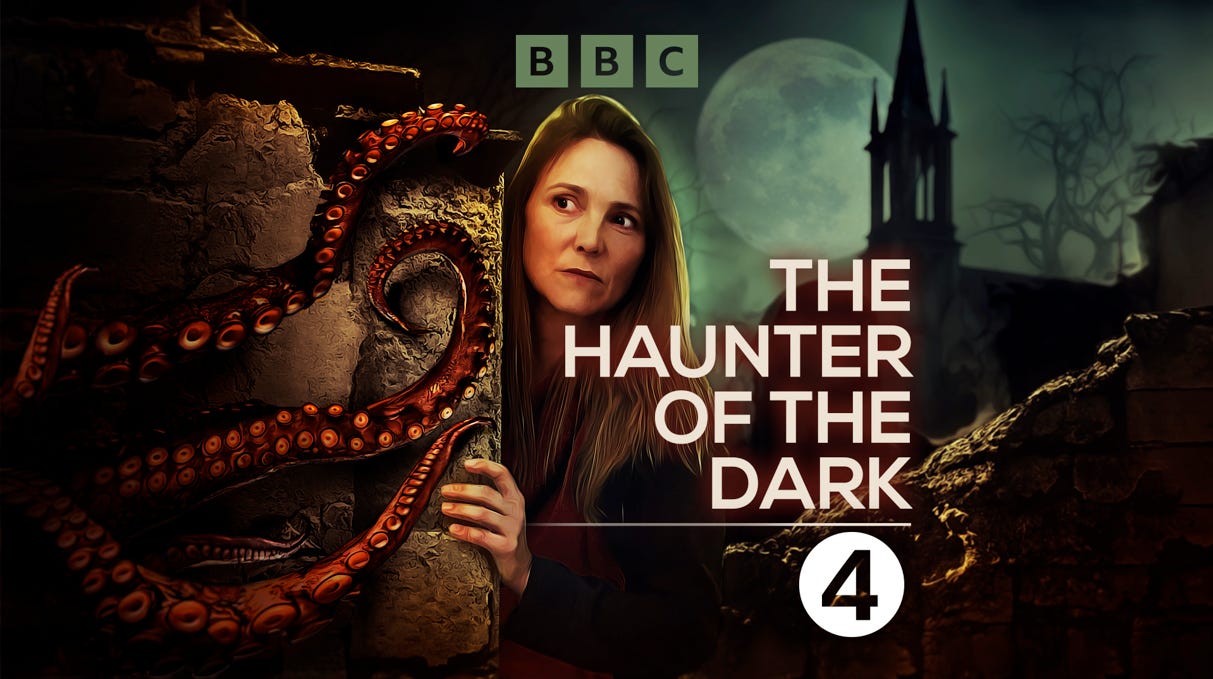
This series was a tough one to write. It had been a minute since I had written these characters, and I had some new voices to introduce up top. But I still had Kennedy, and I still had Eleanor. And, thanks to the side work I had been doing on the Pleasant Green blog, I knew what Kennedy had been up to in the intervening time (the ongoing Saltmarsh Incident storyline from 2020 is currently being serialised online). The minute those two started talking to each other, it was like reuniting with old friends.
For Season 4, Karen Rose stepped backwards and upwards into an Executive Producer role and Sarah Tombling, who had been the script supervisor on the other series, became the producer. She put together a week of recording in a remote (and I mean REMOTE) house in Essex and organised the whole thing meticulously, little realising that the biggest challenge she would face was getting me to finish the scripts in time.
The cast were, as always, wonderful, and the new characters provided the opportunity to work with new people who delivered as if they had been there forever. I had forgotten how much fun it is making this show (I had also forgotten how intense it is, and if I do it again, I won't time it to coincide with having my entire workspace refurbished).
Previous seasons had been re-edited after the fact for Radio 4, but this time Radio 4 were all in from the beginning. Ultimately this necessitated constructing two versions of the show; a fast-paced, narrative-led story that fits into a radio schedule, and a slightly slower version with some deeper dives (and a few additional deep-cut surprises) for BBC Sounds and the podcast apps.
There's more to come from the Pleasant Green universe, not least a movie which I've written and which we are putting together at the moment. There's been TV interest in the Lovecraft Investigations (which I have resisted so far because everyone who has approached me has "thoughts"), and there is the aforementioned Pleasant Green site and the also-aforementioned Byron-Ness project. And there's the beginnings of a role-playing game supplement for one of the great Lovecraftian game systems that I need to get to work on.
As I said at the top, none of this was supposed to happen. An idea for a single drama became a series, became a brand, became a universe. At this point I have no idea if there will be a fifth season of the Lovecraft Investigations, but the Pleasant Green universe has become a sandpit that I get to play in, hopefully, for a long time to come.
In the meantime, The Haunter of the Dark is released on BBC Sounds on Monday, with the Radio 4 version to follow later in the month. I hope you like it. As they say in the show, if you’re just joining us, you should go back to the beginning. Here’s the trailer: https://www.bbc.co.uk/sounds/play/p0glb9px
